The recent Wall Street Journal article, “Supply Chain Woes Carry High Risks, Big Rewards for Some Companies,” highlights how the pandemic and subsequent global disruptions have transformed supply chain resilience from a niche concern into a boardroom priority. As Mirko Woitzik of Everstream Analytics aptly puts it, supply chain risk management has moved from the “backroom to the boardroom.” This shift underscores the increasing importance of advanced strategies and tools to mitigate risks and seize opportunities in the face of uncertainty.
At OpenFLIS, we recognize that building supply chain resilience isn’t just about reactive problem-solving; it’s about adopting proactive, data-driven solutions. Here’s how businesses can leverage technology to address today’s challenges, fortify their operations, and turn risks into competitive advantages.
What Challenges are Supply Chains Up Against?
Supply chains face a perfect storm of disruptions, ranging from geopolitical tensions and labor unrest to natural disasters and shifting regulations. As highlighted by the WSJ article, recent events such as dockworker strikes, Hurricane Helene, and the ongoing conflict in the Middle East have amplified the vulnerabilities of global logistics networks.
Adding to this complexity, U.S. legislation has increased pressure on businesses to reduce reliance on certain suppliers, particularly from China. These challenges make resilience a non-negotiable priority, but as the WSJ notes, this journey is neither cheap nor easy.
Investing in Resilience: The Competitive Edge
Companies that embrace resilience see measurable returns. Research from Oliver Wyman reveals that businesses prioritizing supply chain resilience experienced 23% revenue growth between 2018 and 2023, compared to 15% for their peers. However, the same study shows that only a third of companies are ahead of their resilience targets, and nearly 40% lack a contingency plan entirely.
Flexibility, as Priya Anand of Jabil emphasizes in the WSJ article, is the cornerstone of resilience. By sharing tools with suppliers and sourcing components locally, Jabil has
transformed risk management into a competitive advantage. This proactive approach exemplifies how businesses can turn supply chain challenges into opportunities—a principle at the heart of OpenFLIS’s solutions.
The Role of Technology in Managing Risk
Understanding not just your immediate suppliers but also their suppliers and the raw materials they rely on is crucial. This deeper visibility is where data-driven platforms like OpenFLIS excel. Our technology enables businesses to:
· Access Real-Time Data: OpenFLIS provides detailed, up-to-date information on NSNs (National Stock Numbers), CAGE codes, and other critical elements to ensure informed decision-making.
· Predict Disruptions: Advanced analytics help identify potential risks before they occur, allowing businesses to mitigate disruptions proactively.
· Streamline Compliance: Automated tracking and reporting simplify regulatory compliance, reducing administrative burdens and errors.
By equipping companies with these tools, OpenFLIS empowers them to build supply chains that can adapt to evolving risks and challenges.
Resilience as a Competitive Advantage
Flexibility isn’t just about adapting to change—it’s about thriving amidst uncertainty. As the WSJ article highlights, companies like Jabil demonstrate how supply chain resilience can be a competitive differentiator. Businesses that embrace tools like OpenFLIS can achieve similar results by:
· Identifying alternative suppliers to minimize disruptions and ensure continuity.
· Enhancing decision-making with accurate, actionable data for better outcomes.
· Automating data intake and updates to save time and free your team to address real problems and risks.
· Collaborating with suppliers to build stronger, more resilient networks.
These capabilities position companies to not only withstand disruptions but to use them as opportunities to outperform their competitors.
Looking Ahead: Building a Future-Proof Supply Chain
The WSJ rightly points out that building a resilient supply chain is neither quick nor easy, but the rewards far outweigh the costs. Companies that prioritize resilience today will be better positioned to navigate future uncertainties and capitalize on emerging opportunities.
At OpenFLIS, we are committed to helping businesses achieve this goal. Our robust API and advanced data solutions provide the insights and tools needed to build a supply chain that’s not just resilient but also poised for growth in an unpredictable world.
Whether it’s identifying alternative suppliers, ensuring compliance, or optimizing procurement, OpenFLIS is your partner in transforming challenges into growth opportunities. With the right tools, your supply chain can become a powerful driver of competitive advantage.




